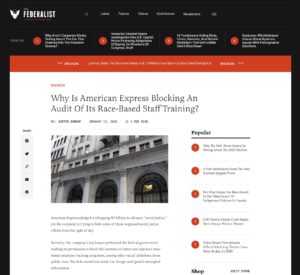
10 Feb 2022 Asking AmEx for Accountability on Racial Agenda
American Express pledged $1 billion to promote social justice causes. It was found to be subjecting its employees to a Critical Race Theory-inspired “Anti-Racism Initiative.” Yet it is unwilling to be up-front about these efforts and their results with the people who have invested money in the credit card giant.
If American Express was proud of its work and willing to stand behind the political direction that managers have taken the company, its lawyers should not be fighting a call for transparency. Instead, it is asking the Biden Administration to allow it to omit a shareholder proposal from the National Center’s Free Enterprise Project asking the company to perform a racial-equity audit and make those findings public.
 In a commentary published by The Federalist, National Center Executive Vice President Justin Danhof asserted that “AmEx will disenfranchise its investors by denying them the right to vote on our resolution.” In making the case for the U.S. Securities and Exchange Council (SEC) to deny the company’s request for permission to keep FEP’s proposal off the American Express annual proxy statement, Justin wrote:
In a commentary published by The Federalist, National Center Executive Vice President Justin Danhof asserted that “AmEx will disenfranchise its investors by denying them the right to vote on our resolution.” In making the case for the U.S. Securities and Exchange Council (SEC) to deny the company’s request for permission to keep FEP’s proposal off the American Express annual proxy statement, Justin wrote:
We firmly believe that our proposal would help AmEx, its employees, its shareholders and other similarly situated corporations. Employee trainings should be designed to increase worker morale and productivity. As we note in our proposal: “[t]raining materials that are too controversial or toxic to release to shareholders are necessarily inappropriate for use with employees, so that publication will increase executive thoughtfulness and decrease overall company risk, to the benefit of all stakeholders.”
American Express should be happy to let the American people – and its shareholders, in particular – know what they are doing to promote a political agenda during their day-to-day business. Justin noted:
[I]f the company’s racial trainings are noble and worthy of its employees’ time, why would American Express seek to block its shareholders from viewing and evaluating them? Surely if the company thinks its materials are helping with the “task of overcoming our country’s racist heritage,” as one of its leaked training materials states, then it would want those lessons shared near and far.
“Perhaps the charge card company’s protestations mean that what is known about these re-education programs are only the tip of the iceberg,” Justin suggested, “and what is known is damning.”
Considering that CEOs typically bristle at shareholders who want answers about how their investment is being handled, what the company is doing – especially after a formal audit is conducted – might justifiably raise a few eyebrows:
For example, [American Express] employees must rate their levels of privilege – based on skin-surface characteristics – and then if members of a subordinate group are present in a room, one must defer to them before one speaks. So, if, for example, a black female is present in a room, all white folks should stay silent until that black female gives her opinion or analysis of the topic.
Just out of curiosity, as a straight white male who holds the most senior position at the firm, does American Express Chief Executive Officer Stephen Squeri need to wait for everyone else in the room to speak before chiming in? Those meetings must take forever.
Company managers also brought in the great-grandson of the founder of the Nation of Islam as a speaker. Khalil Muhammad told the Fortune 500 company’s employees that capitalism is rooted in racism. Justin wrote that FEP’s shareholder proposal was meant to discover the “full slate of potentially racist bilge” in the American Express political portfolio.
Pointing out that the Biden Administration reimposed CRT-style training within the federal government – overturning a Trump Administration order – Justin suggested the SEC should be willing to “do the right thing” and allow American Express shareholders to decide if the company should let investors know the progress of the company’s social justice agenda.
To read all of Justin’s commentary – “Why is American Express Blocking an Audit of Its Race-Based Staff Training/” – click here to go to the website of The Federalist.




